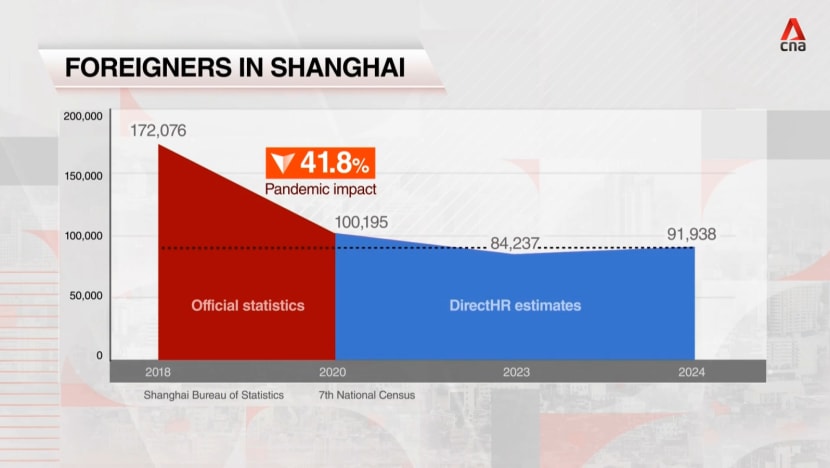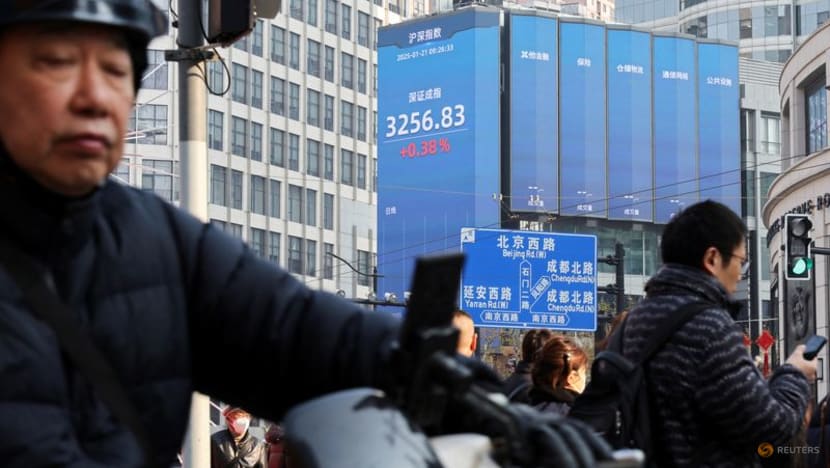SHANGHAI: The bustling metropolis of Shanghai, home to one of the largest expatriate communities in China, has long been the country’s most cosmopolitan city.
But the vibes have changed in recent years for some residents.
As the gateway to China, Shanghai suffered during the draconian COVID-19 lockdowns, which lasted about three years and sparked protests amid public frustration at the government’s zero-COVID policy.
Since the nation reopened its doors to foreigners more than two years ago, tourists have returned to the city – but tourist numbers only tell half the story.
Expats in Shanghai told CNA that many from their community who left during the pandemic have not returned.
Italian chef and tattoo artist “Lucky Lasagna”, who caters mostly to foreigners, feels the change keenly.
He arrived in Shanghai more than a decade ago.
“(There was) an incredible energy and it was the most international city I’d ever been to. The feeling was incredible. Downtown was 50/50 foreigners and local Chinese people,” said the head chef of Bambino restaurant, who declined to give his real name.
“First change was the arrival of the first COVID (wave) and lockdown. That stopped a little bit and the big one was the second lockdown. It was a shock. A lot of foreigners went away,” he added.
DWINDLING EXPAT NUMBERS
Another longtime expat, Melissa Van Der Geest from the Netherlands, first travelled to Shanghai in 2017 for an internship.
She said she then “fell completely in love” with the city where “everything and anything is possible”, like having coffee delivered in 15 minutes to her doorstep.
When the pandemic hit, she went back to her home country but returned to Shanghai in late 2023.
The city she missed, however, has changed.
“People are more careful about the future. They think: ‘Let’s save up our money’, so less consumerism and then of course, also less foreigners,” she said.
About five years ago, she would see expats “on every corner of the street”, but the situation now is a far cry from that, she said.

Van Der Geest, who is a headhunter, said the numbers reflect her experience.
Her employer, recruitment firm Direct HR, studied figures from the Shanghai Bureau of Statistics in 2018 and the 7th National Census in 2020.
This showed that between those two years before and during the pandemic, the number of foreigners in Shanghai dropped more than 41 per cent.
As no official numbers have been released since then, her company came up with estimates based on different expat communities here that have tracked and published statistics. They found that the number of foreigners in Shanghai dropped even further in 2023 before making a slight recovery last year.
Still, the number of foreigners in the city in 2024 was nearly half of what it was in 2018.
Van Der Geest said these expats are not just from Western nations, but also developed Asian countries like Japan. The Japanese are among the largest groups of expats in Shanghai, she added.
“Half of them are leaving. The same goes for the South Koreans and the Singaporeans,” she said.

TOUGHER CHINA MARKET
The pandemic, however, is just one of several factors pushing down expat numbers in Shanghai.
Observers noted that the Chinese market is a far tougher one now for foreign brands, which have to fight for market share with local Chinese brands that have largely caught up in branding and product quality, and are often cheaper.
That comes on top of geopolitical tensions between China and the West, which have made trade difficult.
Allan Gabor, chairman of the American Chamber of Commerce in Shanghai, has had the front-row seat to these evolving dynamics for years.
“Everybody has some concern about US-China trade relations, but the companies that we represent, the vast majority of them are not making any major moves away from China,” he said.
“They need to realise that we’re dealing in a very highly intensive competitive environment in China. They may have to adapt to that in certain ways.”
EXPAT PAY PACKAGES SHRUNK
Some foreign companies are also adapting to the tougher market conditions by slashing their hiring budget.
Van Der Geest said she noticed that expat pay packages have shrunk by as much as 25 per cent.
This is partly also due to the emergence of multilingual Chinese nationals – some educated overseas – whom some foreign companies see as a viable and cheaper option to fill executive jobs in Shanghai, and a way to do away with expensive expat packages.
“For Chinese nationals, there is a lot of unemployment at the moment, and that’s why it’s also easier for employers to find somebody on a lower salary,” said Van Der Geest.
“A decade ago, we saw a completely different expat or foreign package here in China. There were a lot more allowances – so for example, school fees for an international school, a nice apartment and a car for the whole family.”
In contrast, current packages mostly do not include school allowances or have capped housing allowances, she added.
RESTAURANTS, LIFESTYLE BUSINESSES CLOSING
This drop in expat numbers and pay has impacted the food and beverage industry, like Lucky Lasagna’s restaurant.
“Obviously in a Western restaurant, there were a lot of Western customers – not the majority of the customers, but let’s say 20 to 30 per cent of the customers were foreigners that come to (our) place because they really like the food and they drink,” he explained.

Shanghai-based F&B blogger Shen Yiding said he noticed the number of foreign patrons dropped after 2020, when the COVID-19 pandemic hit.
With higher rental costs in Shanghai, the small bistro concept has also become more popular in the city, said Shen.
“The dining places and menus are now cut to size, and scaled to target a smaller group of people. It is partly due to rental cost because in Shanghai, rental makes up a bigger portion of operating cost,” he added.
In the past year, restaurants that went big or catered to the expat market have struggled to fill their tables. Many closed, with other lifestyle businesses that expanded too quickly suffering as well.
For instance, Will’s Fitness was once Shanghai’s largest fitness chain, boasting more than 70 gyms in the city alone at one point.
Now, a majority of them have closed – some shuttered by mall landlords over rental and utility arrears.
BENEFITS FROM ECONOMIC SHIFTS
The foreigner dearth may change as China tries to align its policies for growth, said Lim Han Shen, an associate professor of practice in finance at NYU Shanghai.
“There’s going to be a need for financing, talent, innovation,” he added.
“And from my perspective, having been here in China for the last 18 years, Shanghai is near the top of still attracting talent into China, if not from foreign countries, at least domestically within China.”

Shanghai is well-placed to benefit from seismic shifts in China’s economy, even if it does not become a major player in global finance, he noted.
He said that if China’s trade gradually transitions to be yuan-based instead of dollar-based, Shanghai will be at the centre of that.
With China’s aim to double its gross domestic product by 2035 from 2020 levels, it cannot rely on cheap labour – and technology will be key to increasing its productivity, said Lim.
“There’s going to have to be a lot of trial and error, a lot of capital investment, investment to see how that works. And there’s going to be no better place for raising capital for technology innovation than Shanghai,” he added.
He noted that even if the economy is slowing down in its rate of growth, no one can dispute that China still has “an incredible market size”, especially in terms of the consumer market.
INTERNATIONAL NATURE OF SHANGHAI
Expats aside, estimates show that more than one-third of Shanghai residents are from elsewhere in the country.
It is a charm that Shanghai native Cross Yu is trying to encapsulate at his international award-winning cocktail bar – a vintage-inspired space with a hedonistic disco vibe.
He has even tried to distill the cosmopolitan nature of Shanghai into a cocktail, which is aptly named after the city. It comprises chocolate, peach, fermented bean curd, and cognac.

“Shanghai is just more international; it is in our bones … Everybody is pretty cosmopolitan. We would wear Western clothes, drink coffee, and have Japanese cuisine,” Yu said.
“What is charming about Shanghai is that all Chinese cuisine cultures are represented, yet it has an inclusive international vibe. So, you would not feel out of place here. So long as you live here, you are considered part of Shanghai.”
One of those expats who feels right at home in the city is the Italian chef Lucky Lasagna.
Despite the lacklustre job market and slowing economy, he is staying put in Shanghai with his wife – who hails from the city – and their child.
“It’s a nice place to live, and I’m not only speaking about the banal things like it is safe … It’s the vibe of the city,” he said.
He also thinks Shanghai will regain its vibrancy and energy, with young people in the city taking the lead.
In fact, his confidence about Shanghai’s future has led him to put his money where his mouth is. He is now looking to reopen a passion project that was forced to close during the pandemic – a tattoo parlour aptly named “No way back”.
